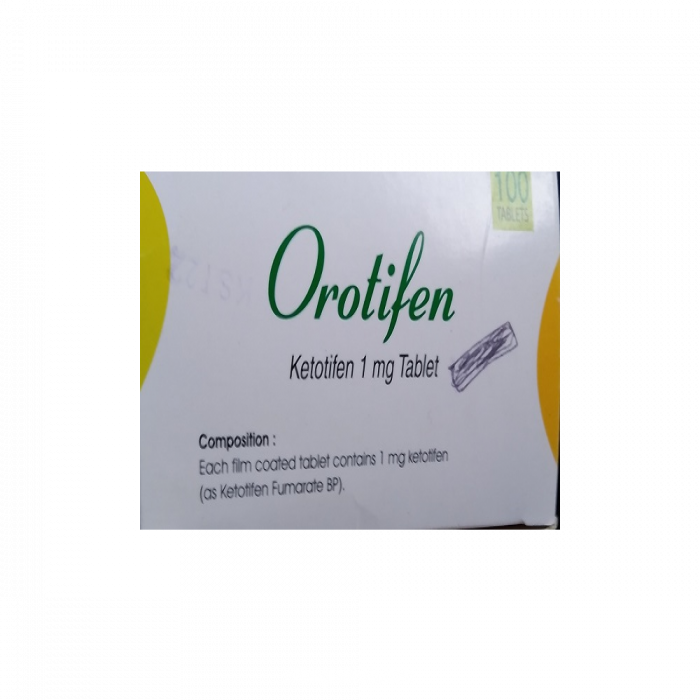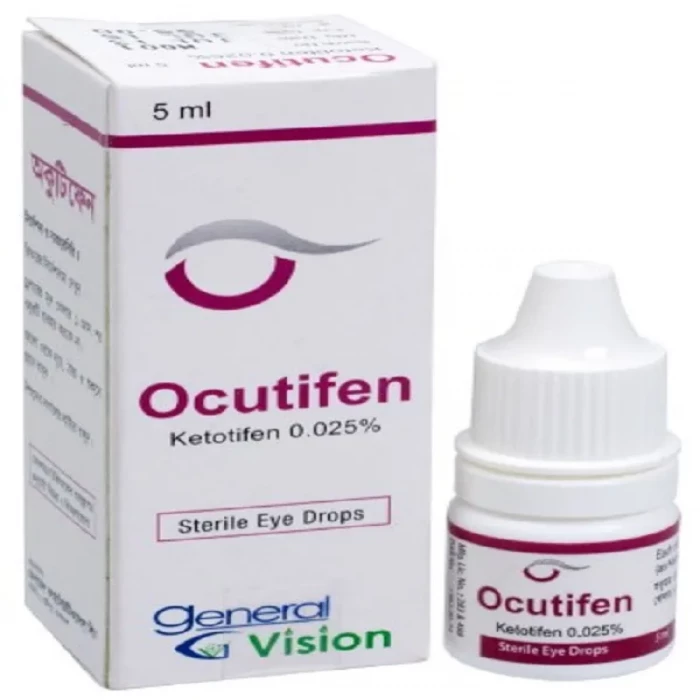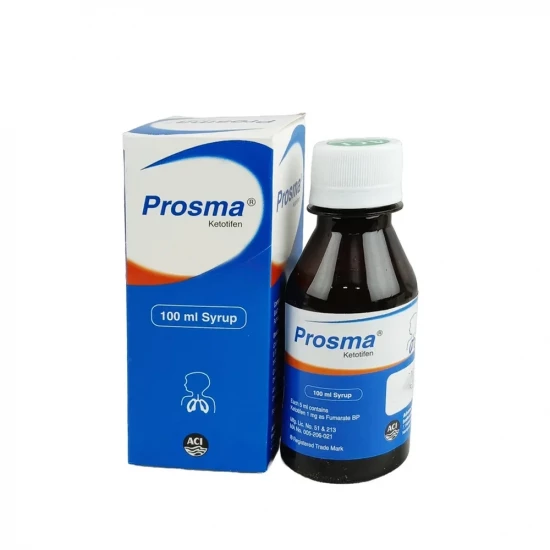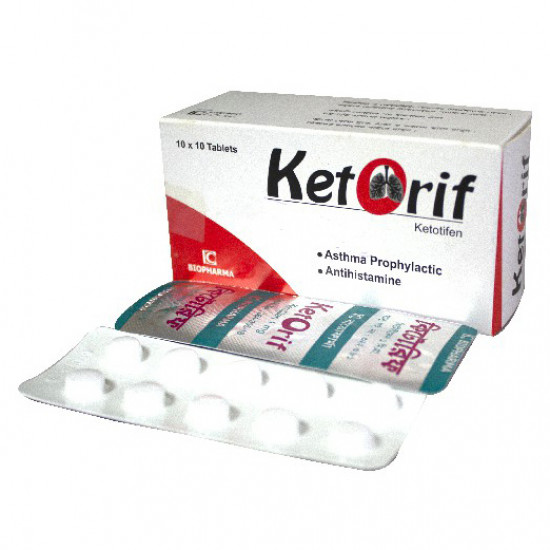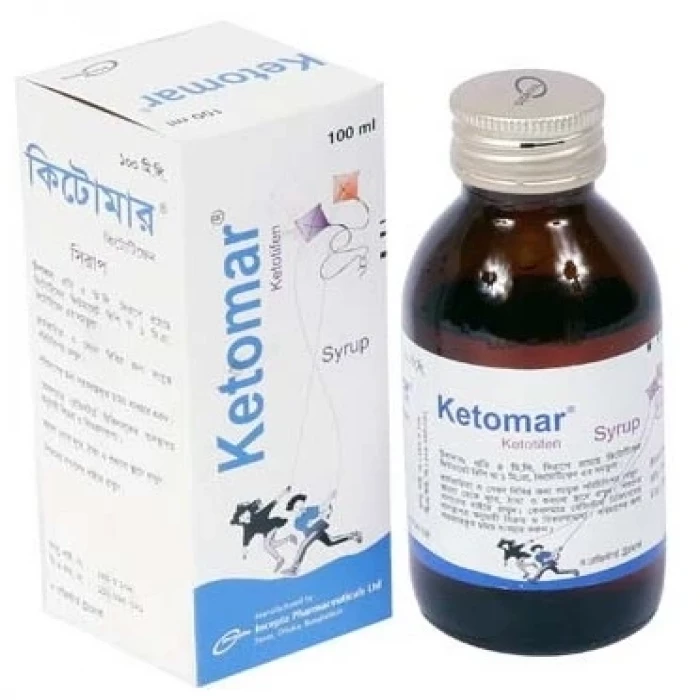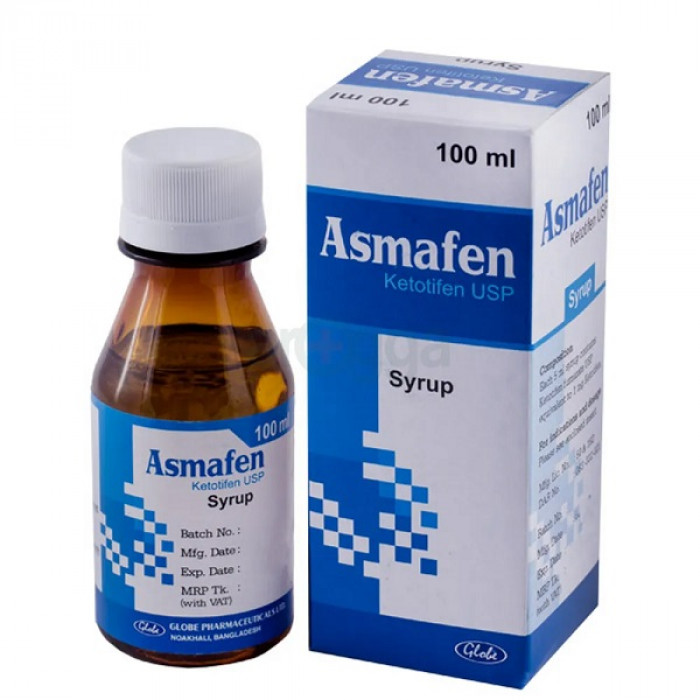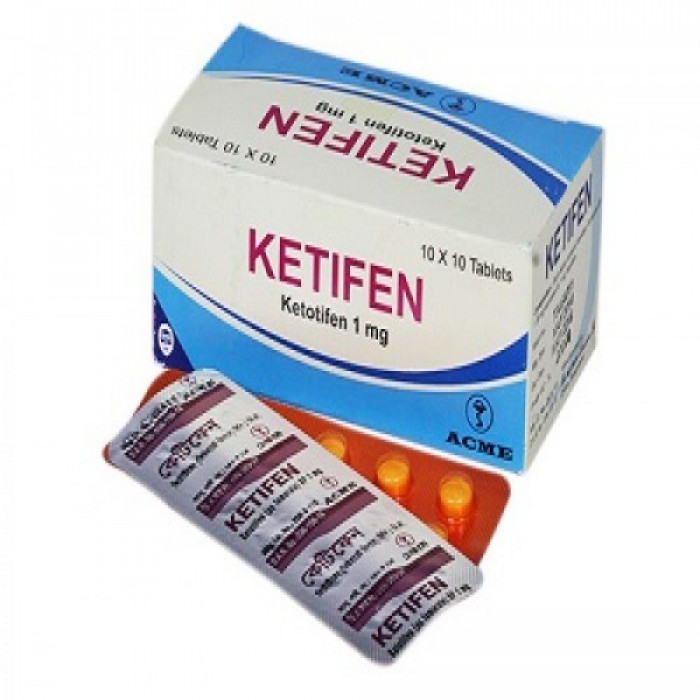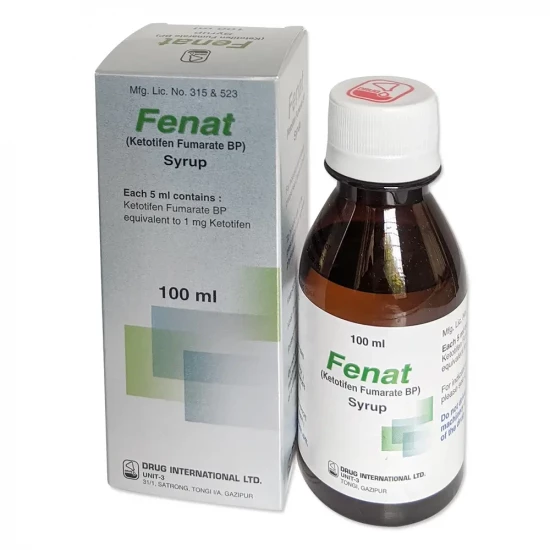
✔ 100% Authentic Product
👁️ Currently Viewing 5515
Fenat Syrup is a prescription medicine used to prevent the symptoms of asthma.
Discount
Price: ৳ 62
MRP:
৳
65
5%
Off

100% Genuine Products, Guaranteed

Safe & Secure Payments, Always

Fast, Secure & Efficient Delivery

Proper Packaging
 Cash on Delivery - All over Bangladesh
Cash on Delivery - All over Bangladesh Regular Delivery - 12-24 Hours, Dhaka City* Charge Tk.39-59
Regular Delivery - 12-24 Hours, Dhaka City* Charge Tk.39-59 Regular Delivery - 24-48 Hours, Other Cities* Charge Tk.99-110
Regular Delivery - 24-48 Hours, Other Cities* Charge Tk.99-110
 ফ্রি ডেলিভারিঃ - ৯৯৯ টাকা+ অর্ডারে, ঢাকা
শহরে
ফ্রি ডেলিভারিঃ - ৯৯৯ টাকা+ অর্ডারে, ঢাকা
শহরে ফ্রি ডেলিভারিঃ - ২৯৯৯ টাকা+ অর্ডারে, ঢাকার
বাহিরে
ফ্রি ডেলিভারিঃ - ২৯৯৯ টাকা+ অর্ডারে, ঢাকার
বাহিরে
100% Genuine Products, Guaranteed
Safe & Secure Payments, Always
Fast, Secure & Efficient Delivery
Proper Packaging
 Cash on Delivery - All over Bangladesh
Cash on Delivery - All over Bangladesh Regular Delivery - 12-24 Hours, Dhaka City* Charge Tk.39-59
Regular Delivery - 12-24 Hours, Dhaka City* Charge Tk.39-59 Regular Delivery - 24-48 Hours, Other Cities* Charge Tk.99-110
Regular Delivery - 24-48 Hours, Other Cities* Charge Tk.99-110 ফ্রি ডেলিভারিঃ - ৯৯৯ টাকা+ অর্ডারে, ঢাকা
শহরে
ফ্রি ডেলিভারিঃ - ৯৯৯ টাকা+ অর্ডারে, ঢাকা
শহরে ফ্রি ডেলিভারিঃ - ২৯৯৯ টাকা+ অর্ডারে, ঢাকার
বাহিরে
ফ্রি ডেলিভারিঃ - ২৯৯৯ টাকা+ অর্ডারে, ঢাকার
বাহিরে
✅ Description:
Fenat Syrup contains Ketotifen, an antihistamine used for the prophylactic treatment of bronchial asthma and allergic conditions like rhinitis. Bronchial asthma is a condition characterized by narrowed airways, swelling, excess mucus production, and symptoms such as difficulty breathing, coughing, wheezing, and shortness of breath. During treatment with Fenat Syrup, it is advised to avoid alcohol consumption. It is not recommended for individuals with epilepsy.
Before taking Fenat Syrup, it is important to inform your doctor if you have a history of sugar intolerance, epilepsy, or diabetes. It is generally not recommended for use in pregnant and breastfeeding women. Common side effects may include agitation, irritability, difficulty sleeping, and nervousness.
Safety Advices

Alcohol
UNSAFE
Interaction with alcohol is unknown. Please consult your doctor.

Pregnancy
UNSAFE
This medicine is not recommended for use in pregnant women unless necessary. All the risks and benefits should be discussed with the doctor before taking this medicine.

Breastfeeding
UNSAFE
Fenat Syrup is not recommended for use in breastfeeding women unless necessary. All the risks and benefits should be discussed with the doctor before taking this medicine.

Driving
CAUTION
Do not drive or use machines while taking Fenat Syrup as you may feel drowsy and your reactions may be slower than usual.

Kidney
CONSULT YOUR DOCTOR
There is limited information available on the use of Fenat Syrup in patients with kidney disease. Please consult your doctor.

Liver
CONSULT YOUR DOCTOR
There is limited information available on the use of Fenat Syrup in patients with liver disease. Please consult your doctor.
✔️ Uses of Fenat Syrup
- Prevention of Asthma
- Allergic Rhinitis
✔️ How does Fenat Syrup work?
Fenat Syrup works by blocking histamine (a substance in the body that causes allergic symptoms) and stops the release of mediators from cells involved in hypersensitivity reactions.
✔️ Side Effects of Fenat Syrup
- Irritation
- Agitation
- Irritability
- Inability to sleep
- Nervousness
- Dizziness
- Dry mouth
- Bladder infection
- Headache
- Nausea or Vomiting
- Diarrhea
- Drowsiness
- Changes in weight
- Insomnia (difficulty in sleeping)
- Nervousness
- Sedation
- Conjunctival inflammation
✔️ Quick Suggestions:
- Staying hydrated is vital for those with a cough or cold. Drinking liquids at room temperature can alleviate cough, runny nose, and sneezing.
- The immune system is affected by stress and raises the risk of being sick. An individual can exercise regularly, meditate, do deep breathing, and try progressive muscle relaxation techniques to relieve stress.
- Try to sleep 7-9 hours each night to stay fit and safe.
- It is advised to avoid contact with known allergens (allergy-causing agents) such as pollen, dust, etc. Certain food items are known to cause allergies to you.
- Maintain personal hygiene and keep your surroundings clean.
✔️ Indication
Ketotifen, a first-generation non-competitive H1-antihistamine as well as mast cell stabilizer, is available in two forms. Firstly, the ophthalmic form is used for treating allergic conjunctivitis and secondly, the oral form is used to prevent anaphylaxis or asthma attacks, as well as different mast cell or allergic-type health problems.
✔️ Pharmacology
Ketotifen is a medication with anti-allergic properties and is commonly used in the prophylactic treatment of asthma. It functions similarly to sodium chromoglycate and acts as an antihistamine. Ketotifen is known for its strong anti-anaphylactic properties, making it effective in preventing asthma attacks. It exerts a sustained inhibitory effect on histamine reactions, which is separate from its anti-anaphylactic properties.
Experimental studies in individuals with asthma have demonstrated that Ketotifen, when taken orally, is as effective as selective mast cell stabilizers administered via inhalation. In contrast, antihistamines were found to be ineffective in these tests. Long-term clinical trials have also investigated the effectiveness of Ketotifen. The frequency, severity, and duration of asthma attacks were reduced, and in some cases, patients experienced complete freedom from attacks. Additionally, some patients were able to gradually reduce their use of corticosteroids and/or bronchodilators.
It's important to note that the prophylactic effects of Ketotifen may take several weeks to fully establish. However, it should be noted that Ketotifen is not intended for aborting established asthma attacks. Its primary role is in the prevention of asthma attacks rather than providing immediate relief during an ongoing attack.
✔️ Dosage & Administration of Fenat Syrup
- For adults, the recommended dosage of Ketotifen is 1 mg taken twice daily with food. In severe cases, the dose may be increased to 2 mg taken twice daily.
- Children above 3 years of age should take 1 mg of Ketotifen twice daily with food. However, if the patient is known to be easily sedated, the treatment may begin with a lower dose of 0.5 to 1 mg at night for the initial few days or as directed by the physician.
- In elderly patients, the same dosage as for adults is typically recommended. However, it is important to follow the advice of the physician regarding the appropriate dosage for elderly individuals.
Check the label for directions before use. Measure it with a measuring cup and take it by mouth. Shake well before use. Fenat Syrup may be taken with or without food, but it is better to take it at a fixed time. It's essential to consult a healthcare professional for accurate dosing instructions and to discuss any specific considerations or concerns related to the use of Ketotifen.
✔️ Interaction
Before taking Fenat Syrup, it is important to inform your doctor about any medications you are currently taking. Fenat Syrup may interact with the following drugs:
Oral medicines for diabetes (such as biguanides, and metformin): Fenat Syrup may interact with these medications and affect their effectiveness. Close monitoring of blood sugar levels may be necessary, and dose adjustments of diabetes medications may be required.
Asthma medications (such as budesonide, and beclomethasone): Concurrent use of Fenat Syrup with these medications may enhance their effects. Your doctor may need to adjust the dosage of both medications to avoid potential complications.
Medications for sleeplessness, anxiety, and depression (such as diazepam, and lorazepam): Fenat Syrup can enhance the sedative effects of these medications, leading to increased drowsiness and impaired coordination. Caution is advised when using these medications together, and your doctor may need to adjust the dosages accordingly.
Antihistamines for allergic reactions (such as brompheniramine, and azelastine): Concurrent use of Fenat Syrup with other antihistamines may lead to an increased risk of side effects such as drowsiness, dizziness, and dry mouth. Your doctor will guide you on the appropriate use of these medications.
Anticoagulants (such as warfarin): Fenat Syrup may interact with anticoagulant medications and affect blood clotting. Regular monitoring of blood clotting parameters may be necessary, and your doctor will adjust the anticoagulant dosage as needed.
In case of overdosage of Fenat Syrup, it is important to seek immediate medical attention. Symptoms of overdose may include blurred vision, confusion, convulsions, disorientation, dizziness, severe drowsiness, faintness or lightheadedness upon standing up, fast or irregular heartbeat, hyperexcitability, loss of consciousness, palpitations, sweating, unusual tiredness or weakness. Contact your doctor or visit the nearest hospital if an overdose is suspected.
It is crucial to follow your doctor's instructions and inform them about all the medications you are taking to ensure the safe and effective use of Fenat Syrup.
✔️ Contraindications
The combination of Ketotifen with oral antidiabetic medications has been associated with a reversible decrease in platelet count in a small number of patients. Therefore, it is generally advised to avoid using Ketotifen in combination with oral antidiabetic medications.
Regarding pregnancy, while there is no evidence suggesting a teratogenic effect of Ketotifen, it is still not recommended for use during pregnancy. The safety of Ketotifen during pregnancy has not been well-established, and it is important to consult with a healthcare professional to weigh the potential risks and benefits before using any medication during pregnancy.
Similarly, when breastfeeding is not possible, it is generally recommended to avoid using Ketotifen. Ketotifen can be excreted into breast milk, and its potential effects on the nursing infant are not fully known. It is advisable to discuss alternative options with your healthcare provider to ensure the safety of both the mother and the baby.
✔️ Pregnancy & Lactation
While there is no evidence suggesting that Ketotifen has teratogenic effects (causing malformations in a developing fetus), it is generally not recommended to use Ketotifen during pregnancy and breastfeeding. The safety of Ketotifen in these situations has not been sufficiently studied, and it is important to prioritize the well-being of the mother and baby. If you are pregnant or planning to become pregnant, or if you are breastfeeding, it is recommended to consult with your healthcare provider before using Ketotifen or any other medication to weigh the potential risks and benefits.
✔️ Precautions & Warnings
It is important to continue the prescribed treatment with Ketotifen for at least two weeks after starting the medication to prevent the possibility of your asthma worsening. This is particularly relevant for patients who are dependent on systemic corticosteroids or ACTH, as they may experience adrenal insufficiency if the treatment is stopped abruptly. If you develop a concurrent infection while taking Ketotifen, it is necessary to receive specific antibiotic treatment in addition to Ketotifen.
It should be noted that on the first day of Ketotifen treatment, your response may be impaired, and it is advised to refrain from operating vehicles or machinery until you are aware of how Ketotifen affects you individually. Furthermore, it is recommended to avoid consuming alcohol while taking Ketotifen, as it can enhance the effects of tranquilizers, hypnotics, antihistamines, and alcohol itself.
✔️ Storage Conditions
Store in a cool and dry place, and protect from light. Keep out of the reach of children.
⚠️Disclaimer:
At ePharma, we’re committed to providing accurate and accessible health information. However, all content is intended for informational purposes only and should not replace medical advice from a qualified physician. Please consult your healthcare provider for personalized guidance. We aim to support, not substitute, the doctor-patient relationship.





